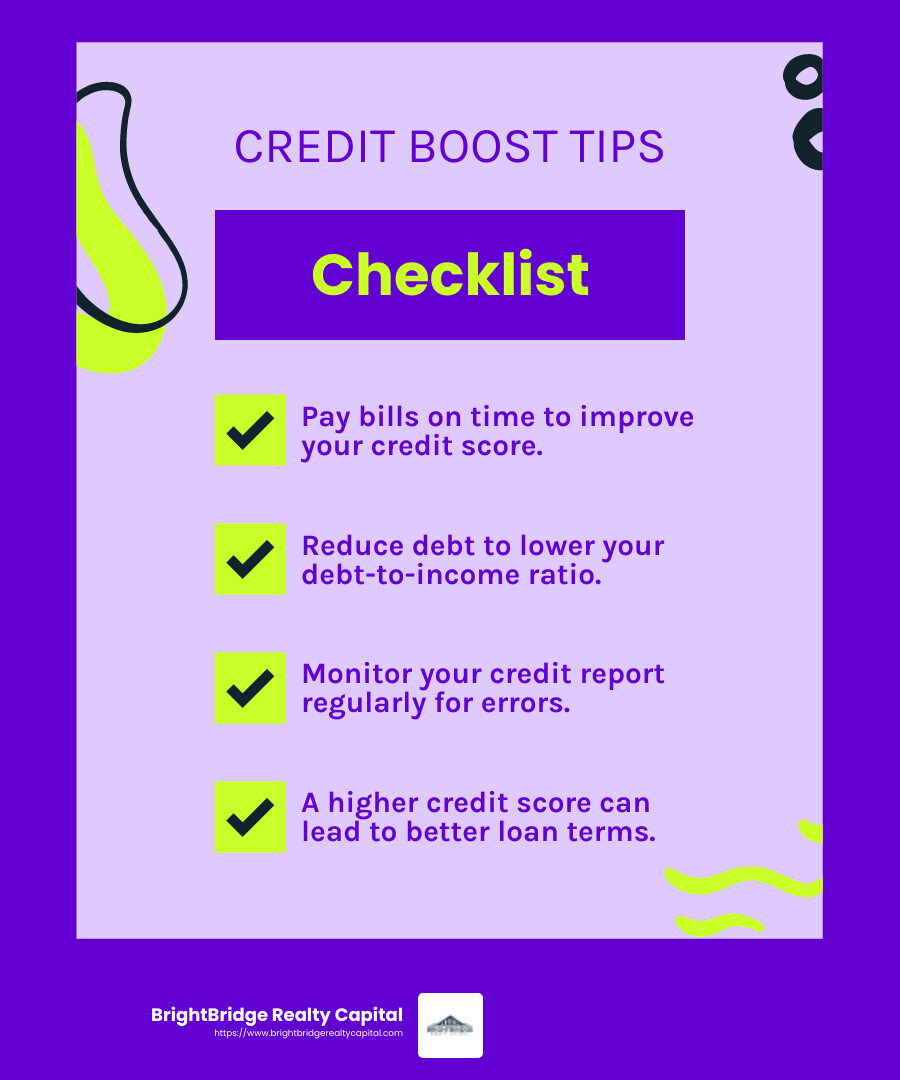The Investor's Handbook: Exploring Real Estate Loan Options

Real estate investment loan options are the gateway to acquiring and growing a profitable portfolio. Whether you're eyeing your first rental property or planning a fix-and-flip venture, it's crucial to understand the financial avenues available. Here's the quick rundown of the primary types of real estate investment loans:
- Conventional Loans: Require larger down payments and higher credit scores.
- Hard Money Loans: Short-term and higher-cost, suitable for quick turnarounds.
- Private Money Loans: Flexible terms, but often come from personal networks.
- Home Equity Loans and HELOCs: Tap into your property's equity, posing a foreclosure risk.
Real estate has long been a lucrative asset class that continues to appeal to investors seeking steady cash flow, tax advantages, and portfolio diversification. From residential homes to busy commercial spaces, these investments can offer predictable returns that withstand market fluctuations.
However, financing an investment property isn't as straightforward as obtaining a mortgage for a primary residence. The high perceived risk means lenders impose stricter criteria and more rigorous requirements. Aspiring investors must steer this complex terrain of real estate loans carefully to maximize their investments' potential.
To explore the right loan options for your investment goals, let's dive deeper into the solutions that can help you effectively capitalize on opportunities.

Easy real estate investment loan options glossary:
Understanding Real Estate Investment Loan Options
When it comes to building a successful real estate portfolio, real estate investment loan options play a pivotal role. These options are not just about securing funds; they're about choosing the right path that aligns with your investment strategy and financial goals.
Financing Options for Investment Properties
Investing in real estate is more than just buying properties. It's about leveraging the right financing options to maximize returns and minimize risks. Here’s a closer look at some of the primary financing options available for investment properties:
Conventional Mortgages: These are the most common and are issued by private lenders. They follow guidelines set by Fannie Mae and Freddie Mac. While they offer stability, they require higher credit scores and larger down payments compared to loans for primary residences.
Hard Money Loans: Ideal for short-term investments, these loans are often used for fix-and-flip projects. They come with higher interest rates and fees but offer quick access to funds, making them suitable for investors who need to act fast in competitive markets.
Private Money Loans: These loans come from personal networks rather than traditional financial institutions. They offer flexibility in terms and conditions but can strain personal relationships if not managed carefully.
Home Equity Loans and HELOCs: By leveraging the equity in your existing home, these options provide a way to finance additional property purchases. However, they carry the risk of foreclosure if you default on payments.

Importance of Creditworthiness
Your creditworthiness is a critical factor in securing favorable loan terms. Lenders assess your credit score to gauge your ability to repay the loan. A higher credit score can lead to better interest rates and lower down payment requirements. For instance, a minimum credit score of 620 is often needed for conventional loans, but a score of 680 or higher can significantly improve your chances of securing a competitive rate.
To improve your creditworthiness, consider the following steps:
- Pay Bills on Time: Consistent, on-time payments can boost your credit score over time.
- Reduce Debt: Lowering your debt-to-income ratio can improve your appeal to lenders.
- Monitor Your Credit Report: Regularly check your credit report for errors and address any discrepancies promptly.

Navigating the Complex Terrain
Securing financing for an investment property involves more than just choosing a loan type. It requires a strategic approach to align your financing with your investment goals. Whether you aim to generate passive income through rental properties or seek capital gains through property appreciation, understanding the nuances of each loan option is crucial.
In the next section, we'll dig into conventional loan options for real estate investors, exploring the specific requirements and benefits they offer.
Conventional Loan Options for Real Estate Investors
When it comes to real estate investment loan options, conventional mortgages are often the go-to choice for many investors. These loans are issued by private lenders and adhere to the guidelines set by Fannie Mae and Freddie Mac. They offer a sense of stability and familiarity, but come with specific requirements that investors need to meet.
Key Features of Conventional Mortgages
Credit Scores: Conventional mortgages require higher credit scores compared to loans for primary residences. Typically, a minimum credit score of 620 is needed. However, for a more favorable interest rate, a score of 680 or higher is often recommended.
Down Payments: Investors should be prepared for larger down payment requirements. While primary home buyers might get away with as little as 3% down, investment properties usually demand at least 20% down. This higher down payment helps offset the perceived risk by lenders.
Interest Rates: Due to the increased risk associated with investment properties, interest rates for conventional loans are generally 0.5% to 0.75% higher than those for primary residences.
Reserve Requirements: Lenders often require that investors maintain cash reserves equivalent to six months of mortgage payments. This ensures that investors can cover the mortgage even if rental income temporarily halts.
Pros and Cons
Pros:
- Wider Acceptance: Conventional loans are widely recognized and accepted by sellers and real estate agents.
- Potentially Lower Interest Rates: For investors with strong credit, conventional loans can offer competitive interest rates.
- Flexibility: They can be used for various property types, including primary residences, second homes, and investment properties.
Cons:
- Stricter Qualifications: Higher credit scores and lower debt-to-income ratios are often required.
- Higher Down Payments: The 20% or more down payment requirement can be a hurdle for some investors.
- Property Limitations: Lenders may limit the number of properties on which you can have loans, often capping it at ten.
Strategic Considerations
While conventional mortgages are a popular choice, they may not be suitable for everyone. Investors looking to scale their portfolios quickly might find the down payment and reserve requirements restrictive. Moreover, as you acquire more properties, the ability to secure additional conventional loans diminishes due to stricter lender criteria.
Understanding these nuances can help you decide whether conventional mortgages align with your investment strategy. In our next section, we'll explore alternative financing solutions that offer more flexibility for real estate investors.
Alternative Financing Solutions
For real estate investors seeking flexibility beyond conventional loans, alternative financing solutions can be a game-changer. These options often have different criteria, making them accessible to a broader range of investors. Let's explore some of these solutions: hard money loans, private money loans, home equity loans, and HELOCs.
Hard Money Loans
Hard money loans are short-term loans secured by real estate. Unlike traditional loans, they focus on the property's value rather than the borrower's creditworthiness.
Key Features:
- Quick Approval: These loans can be approved in days, not weeks.
- Higher Interest Rates: Due to their riskier nature, expect interest rates to be higher.
- Short Term: Typically 12 months to 5 years.
Ideal For: Investors looking to flip properties or those who can't qualify for conventional loans.
Pros:
- Fast funding.
- Less emphasis on credit scores.
Cons:
- Higher costs.
- Short repayment terms.
Private Money Loans
Private money loans come from individuals or private companies willing to lend based on the property's potential return.
Key Features:
- Flexible Terms: Terms can be negotiated between the borrower and lender.
- Personal Connections: Often involve family or friends, which can be both a pro and a con.
Ideal For: Investors with unique property opportunities or those with poor credit.
Pros:
- Customizable terms.
- Quick access to funds.
Cons:
- Risk of straining personal relationships.
- Lack of formal borrower protections.
Home Equity Loans
Home equity loans allow you to borrow against the equity in your existing property, providing a lump sum at a fixed interest rate.
Key Features:
- Fixed Rates: Provides predictable monthly payments.
- Lump Sum: Receive all funds at once.
Ideal For: Investors needing a large sum for a down payment or renovations.
Pros:
- Lower interest rates than personal loans.
- Tax-deductible interest (in some cases).
Cons:
- Risk of foreclosure if payments aren't met.
- Tied to your primary residence's equity.
HELOCs (Home Equity Line of Credit)
A HELOC functions like a credit card, offering a revolving line of credit based on your home's equity.
Key Features:
- Variable Interest Rates: Rates can fluctuate over time.
- Draw and Repayment Phases: Can withdraw funds during the draw phase, then repay during the repayment phase.
Ideal For: Investors needing flexible access to funds for ongoing projects.
Pros:
- Flexibility in borrowing.
- Only pay interest on the amount used.
Cons:
- Variable rates can lead to unpredictable payments.
- Risk of losing your home if you default.
These alternative financing solutions provide diverse options for investors looking to capitalize on real estate opportunities. Whether you're flipping a house or expanding your rental portfolio, understanding these options can help you choose the best path for your investment goals.
Next, we'll explore creative financing strategies that can further improve your real estate investment portfolio.
Creative Financing Strategies
When traditional loans don't fit the bill, creative financing strategies can open new doors for real estate investors. Let's explore some innovative ways to fund your next property: seller financing, crowdfunding, and syndicates.
Seller Financing
In seller financing, the property seller acts as the bank. Instead of getting a loan from a financial institution, you make payments directly to the seller.
Benefits:
- Quick Transactions: Bypass lengthy bank processes.
- Flexible Terms: Negotiate terms that suit both parties.
Risks:
- Higher Interest Rates: Often higher than traditional loans.
- Potential for Default: If you miss payments, the seller could foreclose.
Case Study: Imagine you find a property in New York that banks won't finance due to its condition. The seller offers to finance it, allowing you to repair and eventually rent it out. This flexibility can be a lifesaver for investors with less-than-perfect credit or unconventional properties.
Crowdfunding
Crowdfunding pools money from many investors to fund real estate projects. It's like passing the hat around, but online.
Benefits:
- Low Minimum Investment: Start with as little as a few hundred dollars.
- Access to Larger Projects: Participate in big deals without big money.
Challenges:
- Illiquidity: Funds are often tied up for years.
- Management Fees: These can eat into your profits.
Interesting Fact: Some platforms boast returns between 2% and 20% annually. However, these can be risky, as projects often turn to crowdfunding after failing to secure traditional financing.
Syndicates
Syndicates involve a group of investors pooling resources to buy property. Think of it as a real estate club with a formal structure.
Benefits:
- Shared Risk: Spread the financial risk among multiple investors.
- Access to Expertise: Often led by experienced sponsors.
Considerations:
- Complex Management: Requires legal entities and regulatory compliance.
- Experienced Investors Only: Best suited for those with deep pockets and a strong understanding of the market.
Quote: A seasoned investor once said, "Joining a syndicate is like having a team of experts working for you. But remember, it’s not for the faint-hearted."
These creative financing strategies can provide the flexibility and opportunities you need to grow your real estate portfolio. Whether you're negotiating directly with a seller, joining forces with other investors, or tapping into the power of the crowd, these options can help you steer the complex world of real estate investment.
Next, we'll tackle some frequently asked questions about real estate investment loan options to help you make informed decisions.
Frequently Asked Questions about Real Estate Investment Loan Options
What are the best loan options for investment properties?
When it comes to financing investment properties, several loan types stand out due to their unique benefits:
Conventional Loans: These are standard mortgages available to investors. They usually require higher credit scores and larger down payments compared to primary residence loans. Interest rates tend to be competitive, but the criteria are strict.
DSCR Loans: These loans are particularly appealing for rental property investors. They focus on the property’s ability to generate income rather than the borrower’s personal financial situation. This makes them attractive for those looking to maximize cash flow and qualify for larger loan amounts.
Private and Hard Money Loans: These offer quick access to capital with flexible terms. However, they come with higher interest rates and are typically used for short-term investments or when conventional financing is not an option.
Each option has its pros and cons, so it's crucial to assess your financial situation and investment goals to choose the best fit.
How do DSCR loans work for real estate investors?
DSCR loans are designed to evaluate a property's cash flow potential rather than the borrower's personal income. The Debt Service Coverage Ratio (DSCR) is calculated by dividing the property's net operating income by its debt obligations. A DSCR greater than 1 indicates the property generates enough income to cover its debts, making it a safer bet for lenders.
Benefits:
- Flexible Criteria: Less emphasis on personal credit scores and income.
- Higher Loan-to-Value Ratios: Often allow for more significant borrowing against the property's value.
- Faster Approval: Streamlined process focused on property performance.
For investors, DSCR loans offer a pathway to leverage rental income for acquiring and expanding their real estate portfolios.
Can I use a VA or FHA loan for investment properties?
VA and FHA loans are primarily designed for primary residences, but there are exceptions:
FHA Loans: You can purchase a property with up to four units using an FHA loan, provided you live in one of the units. This is a strategy known as "house hacking," where you live in one unit and rent out the others.
VA Loans: These are available to eligible veterans and can be used to buy multifamily properties, up to seven units, as long as the veteran occupies one of the units.
While these loans offer lower interest rates and down payment requirements, they come with the stipulation that the property must serve as your primary residence. This can be a strategic way to enter the investment market while benefiting from government-backed loan programs.
These real estate investment loan options provide various pathways for investors to finance their ventures. Understanding each option's nuances can help you choose the best strategy to meet your investment goals.
Conclusion
At BrightBridge Realty Capital, we understand that time is money, especially in real estate. That's why we focus on fast closings and direct lending to help you seize opportunities without delay. Our approach eliminates intermediaries, allowing us to offer competitive rates and a seamless process from start to finish.
Fast Closings: We know that in real estate, timing is everything. Our streamlined process often allows us to close deals within a week. This speed gives you the flexibility to act quickly on investment opportunities, ensuring you don't miss out on potential gains.
Direct Lending: By working directly with us, you can avoid the complications and added costs that come with middlemen. This direct approach not only speeds up the process but also ensures you get the best rates available custom to your specific needs.
Whether you're looking to expand your rental portfolio, venture into fix-and-flip projects, or explore new construction, our real estate investment loan options are designed to fit your strategy. With our expertise and commitment to fast, flexible funding, we can help keep your investment strategy moving forward.
Explore more about our customized loan solutions and how we can support your real estate investment journey here.


